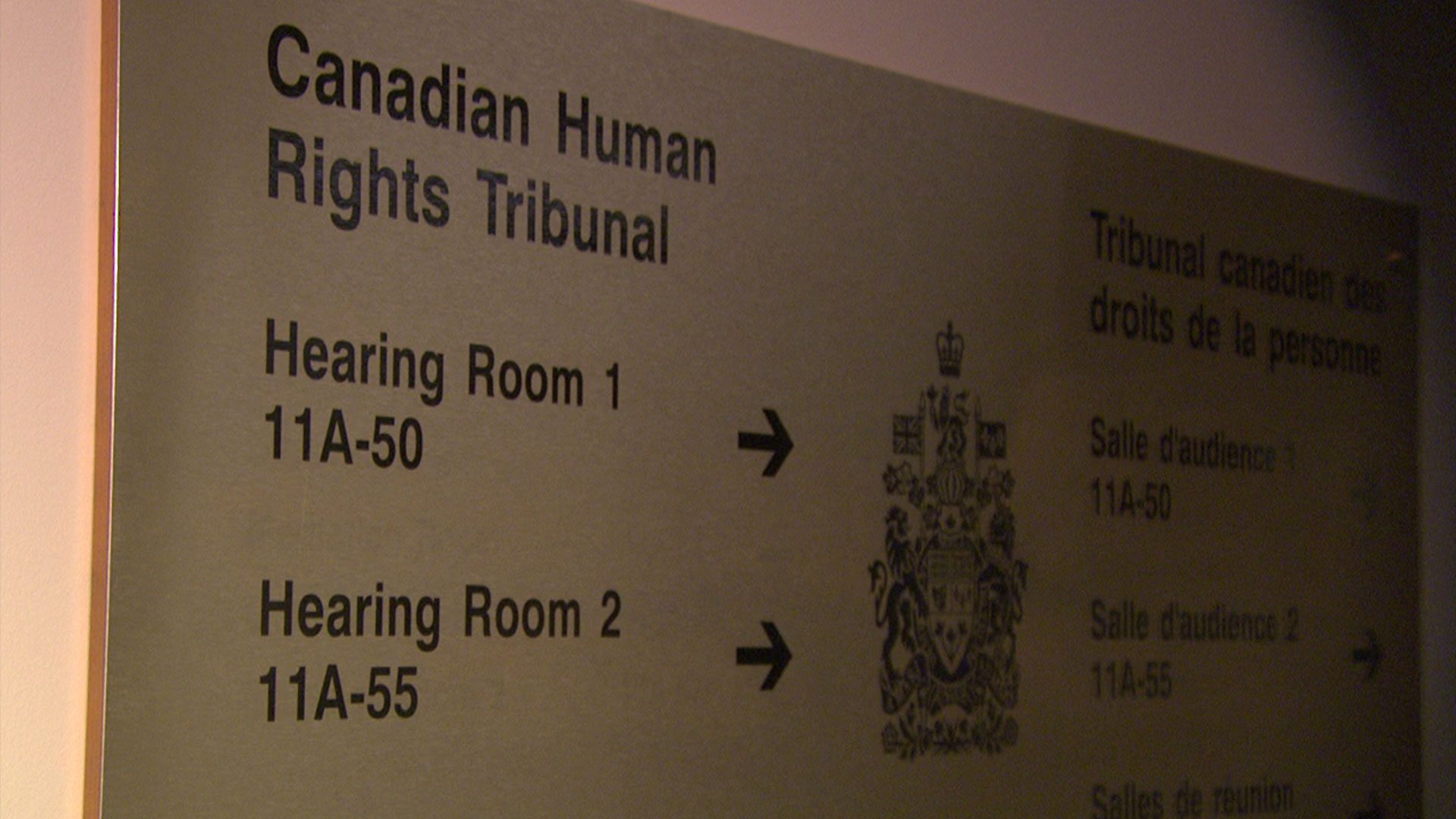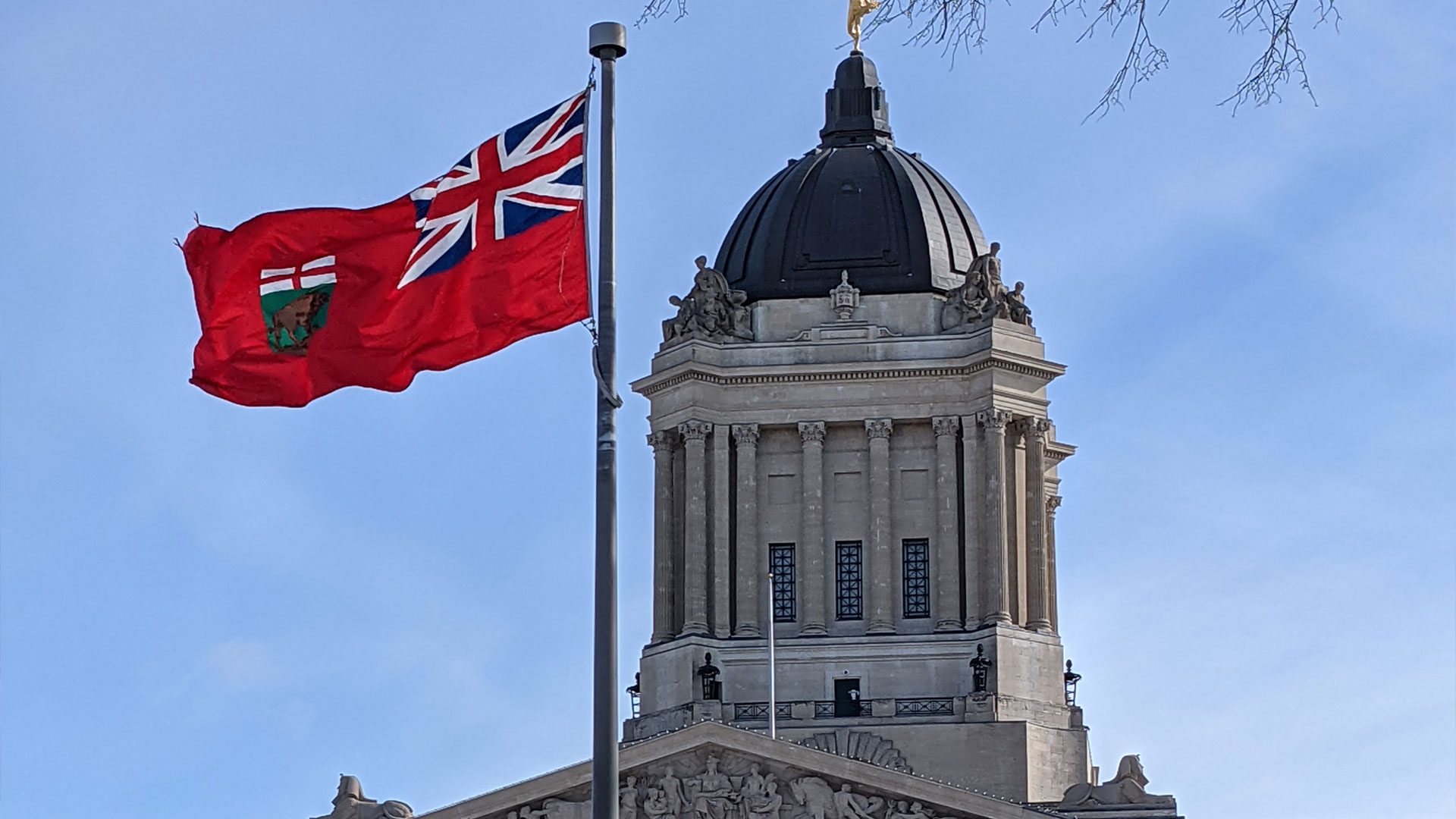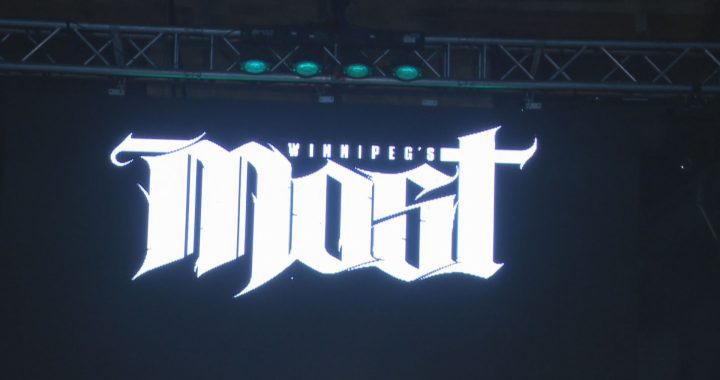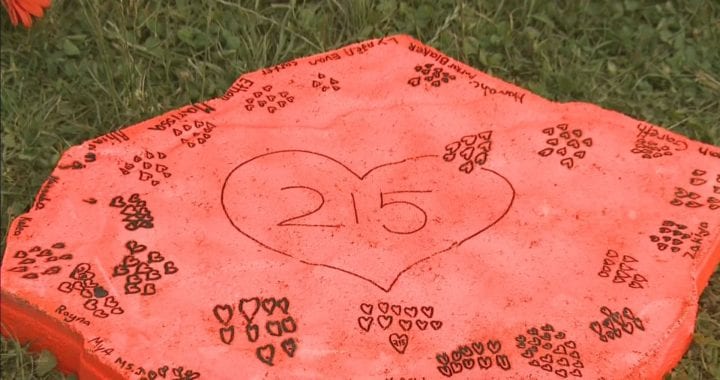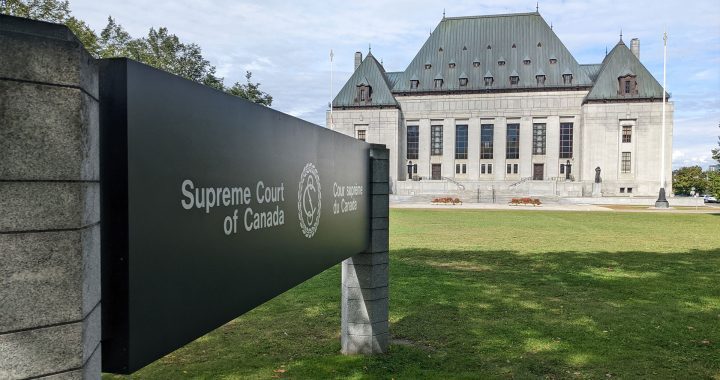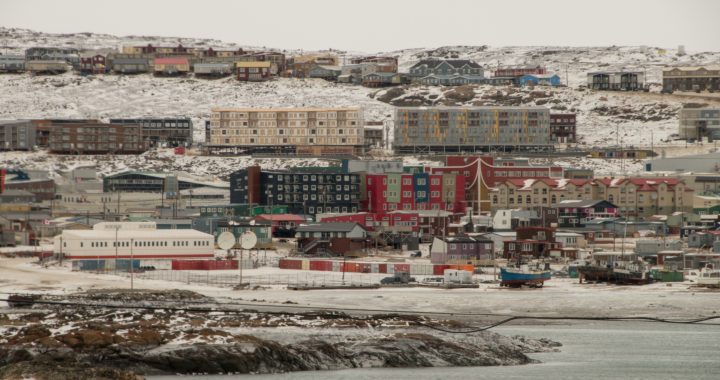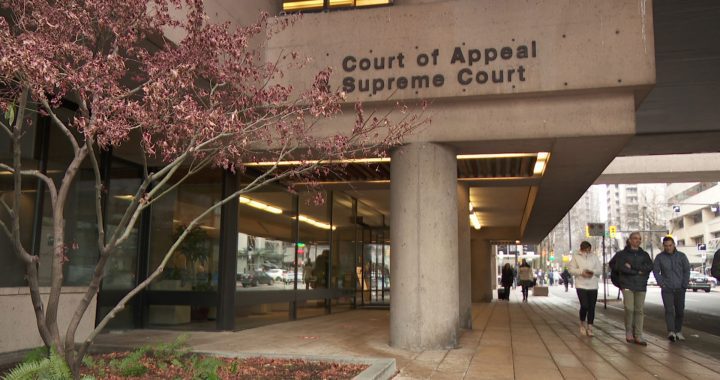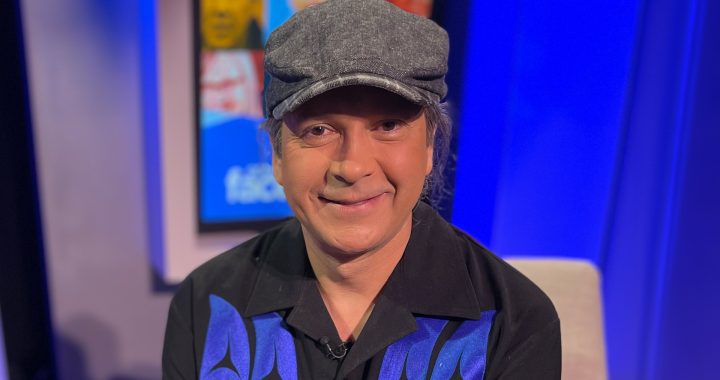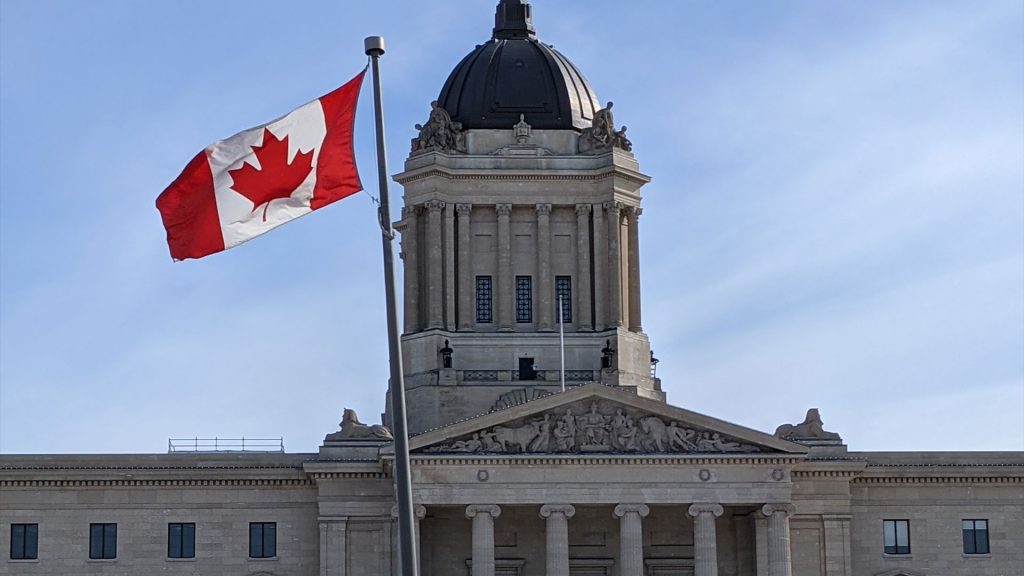
The Canadian flag flies at the Manitoba legislature in WInnipeg. Photo: Jared Delorme/APTN.
A class-action lawsuit filed by two First Nations women in Manitoba on behalf of off-reserve survivors of the child welfare system is heading to court with each of the defendants blaming the other.
Both Canada and Manitoba are asking for the claim filed by Tracy McKenzie and Amber Fontaine to be dismissed. A certification hearing is scheduled for March 2025.
The lawsuit, originally filed by McKenzie in 2021, alleges harms related to her time in care. Fontaine added her name to the case in 2023.
“To be honest, I don’t really remember a whole lot about my life before the system,” McKenzie told APTN News. “When I was taken into care, I was quite young.”
The case mirrors others class action lawsuits filed in British Columbia, Alberta, Saskatchewan, Ontario and Quebec.
It seeks damages for off-reserve First Nations people, Inuit and Métis going back to 1992 and up to when the lawsuit is either certified or another date is set by the courts.
“I don’t have memories the same way that a lot of people do – I am bits and pieces,” McKenzie said in an interview. “Living in so many different places affected my understanding of what a family was. I didn’t really have an idea of what a family was. I had different people in different places and different situations, explaining to me and showing me what they thought they should be showing me about what a family is.”
McKenzie, who was born in 1990, is a member of Temagami First Nation in Ontario. She was born in Winnipeg to a mother who was a ‘60s Scoop survivor. Her grandparents were residential school survivors.
She was taken from her family at the age of three, and, according to the statement of claim filed in Winnipeg, lived in 30 placements that included “safe houses, shelters, group homes, hotels, emergency shelters and foster homes.”
“[There is] damage you experience from living with people who are just paid to take care of you, who are not necessarily there for the right reasons,” she said. “The lack of self-worth that I have, the feelings of inadequacy.”
APTN didn’t speak with Fontaine for this article, but the statement of claim says she is Ojibway, was born in 1987, and has status under the Indian Act through family in Sagkeeng First Nation. The claim says she was born in Pine Falls, Man., and taken into care at the age of six while living off reserve.
She spent a little more than six months in care, but during that time she says she “experienced intense anti-Indigenous racism.”
“She was forced to attend church with a foster family, and was provided no opportunity to connect with Ojibway practices or spiritual teachings, as she had been exposed to when living at home with her own family,” says the claim.
“As a child, she had naturally occurring strands of white hair. She was very proud of it, as in her Ojibway culture white hair is a sign of wisdom. When Ms. Fontaine shared this fact with a foster family, the foster mother sat her down and forcibly plucked the white hairs from her head, because that worldview was incompatible with the Christian culture of the foster family.”
According to the claim, her foster father called her “blackie” because of her dark skin.
Off-reserve children
The claim alleges that “Canada and Manitoba have knowingly underfunded child and family services for Removed Child Class members in Manitoba. This chronic underfunding, neglect, and outright avoidance of their constitutional and legal duties to Indigenous children, youth, and families has prevented child and family services from providing adequate services and care. As a result, it has failed generations of Indigenous children and families who have come into contact with that system.”
It further alleges the governments “engaged in a discriminatory practice” that “prioritized and incentivized the removal of Indigenous children from their families” and breached their charter rights.
However, Manitoba puts the blame solely on Canada for the plight of off-reserve children in the child welfare system.
“… Colonialism, residential schools, the 60’s Scoop, and other national policies introduced by Canada,” says the statement of defence filed by Manitoba on Dec. 28, 2023, “caused or contributed to poverty, lower education rates, and conditions of social and familial functioning on First Nations and among Indigenous peoples off-reserve.”
It denies Manitoba’s “management of child welfare” was done “in a manner to assimilate Indigenous children, or that it has employed discriminatory practices to destroy Indigenous families or cultures.”
The province added that “Indigenous children who reside off-reserve, are provided with equivalent opportunities to access provincial services as non-Indigenous children; in the alternative, says that the harms alleged by the plaintiffs are not compensable through this action.”
APTN reached out to Premier Wab Kinew’s office to comment on the case. According to a cabinet spokesperson, “the government of Manitoba is unable to comment on a matter that is currently before the courts.”
Canada, in its statement of defence filed Feb. 29, pointed the finger right back at Manitoba.
“Manitoba has legislative jurisdiction under section 92 of the Constitution Act,” the claim said. “At all material times, Manitoba, and not Canada, exercised its jurisdiction through provincial entities acting pursuant to its child and family services legislation. For its part, Canada did not exercise jurisdiction or have control over the child welfare or essential services at issue and provided no direct funding for the provision of off-reserve child welfare services. It follows that the circumstances set out in the Claim do not give rise to any duties in law or equity as against Canada.”
Mohsen Seddiigh, a lawyer involved in the case said he’s not surprised by what Manitoba and Canada filed.
“Canada says it’s not my problem and Manitoba says it’s not my problem it’s Canada’s,” he said. “They’re planning a bit of a game with a tennis ball here. Each of them said the action should be dismissed because it’s not their fault – it’s the other ones. I’m not surprised that governments decide to fight lawsuits, it’s a bit of the old mindset.”
On-reserve $43 billion settlement
Another of McKenzie and Fontaine’s lawyers, Harold Cochrane, told APTN the off-reserve class action is looking for the same results as a case that was recently settled with the federal government for $43 billion.
That case started at the Canadian Human Rights Commission in 2007 and was launched by the Assembly of First Nations and the First Nations Child and Family Caring Society. The organizations alleged Canada was underfunding child welfare services on First Nations in all provinces and Yukon.
The Canadian Human Rights Tribunal, which heard the case, ruled in 2016 that Canada “willfully and recklessly” discriminated against First Nations children who lived on reserve and were taken into care by underfunding the system that was supposed to help them and ordered compensation.
After years of appeals and negotiations, the federal government agreed to pay $43 billion – more than half of which will compensate thousands of on reserve children and families – and the rest will go towards fixing the on-reserve child welfare system.
“That class action [federal] only related to First Nation children on reserve. It left out the vast majority of Indigenous children who are in care and those are off-reserve children,” said Cochrane. “So the class action that we’re talking about is, for a lack of a better word, to help fill in that gap. It’s meant to address, or help those children who were left out of that $40 billion settlement.
“They don’t benefit at all from that and their rights are no less than children living on reserve.”
Manitoba isn’t the only jurisdiction pushing back against similar class actions. In British Columbia, the provincial government said in its statement of defence that “The Plaintiffs have not suffered any loss or damage that was caused or contributed to by any negligence, breach of any legal duty, or breach of the Charter, by or on behalf of the Province.”
A hearing for the certification is scheduled for October 2024.
In Quebec, a class action that originated in the Inuit territory of Nunavik, alleges, among other issues, that Canada and Quebec prioritized “removing Indigenous children from their homes instead of providing Indigenous parents with services to care for their children at home.” While the class action was certified by a Quebec judge, the province is currently challenging that certification in court.
The governments of Alberta, Saskatchewan and Ontario have yet to file a statement of defence.
Manitoba settles lawsuit over taking money from children
When the class action was launched in Manitoba, the province was under the leadership of the Progressive Conservative Party. But with the election of the NDP government in 2023 – and Canada’s first Anishinaabe premier in Wab Kinew – there was hope that the new administration would handle this case in a different way.
For example, Manitoba announced on March 25 it was willing to settle lawsuits alleging it wrongly took money from children in its care between 2005 and 2019.
Cochrane, whose law firm was involved in that case as well, said the province would have saved an estimated $200 million in penalties and interest had officials negotiated when the lawsuit was first filed in 2018.
He hopes it doesn’t make the same mistake in this case.
“We certainly would appreciate that he [Kinew] along with his other ministers who are First Nation would bring a different understanding to that level of government,” said Cochrane. “We also recognize that he’s the premier and he’s got a job to do and certainly aren’t expecting any special favours.
“However, expecting to deal with the government that might be a little more understanding and that’s our hope … a better understanding of the issues.”
Manitoba is asking that the class action be dismissed “with costs.”
There are approximately 10,000 children in Manitoba’s child welfare system, and approximately 90 per cent are First Nation, Inuit or Métis.
McKenzie, now a mother herself, has been diagnosed with “clinical depression and post-traumatic stress disorder,” said the claim.
“Being a part of this lawsuit is important to me because as I was growing up, all I wanted, all I really, really wanted, was belonging,” she told APTN. “I wanted connection because that’s what a human being needs.”
With files from Tamara Pimentel.
Editor’s Note: This story was updated on March 31 to correct the name of the First Nation Lynn McKenzie is a member of.



